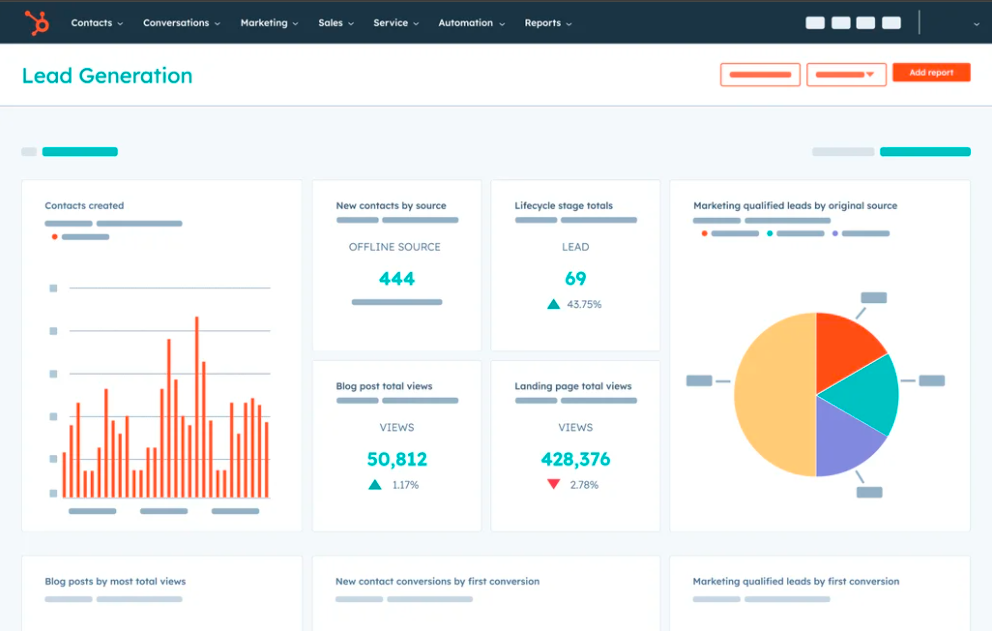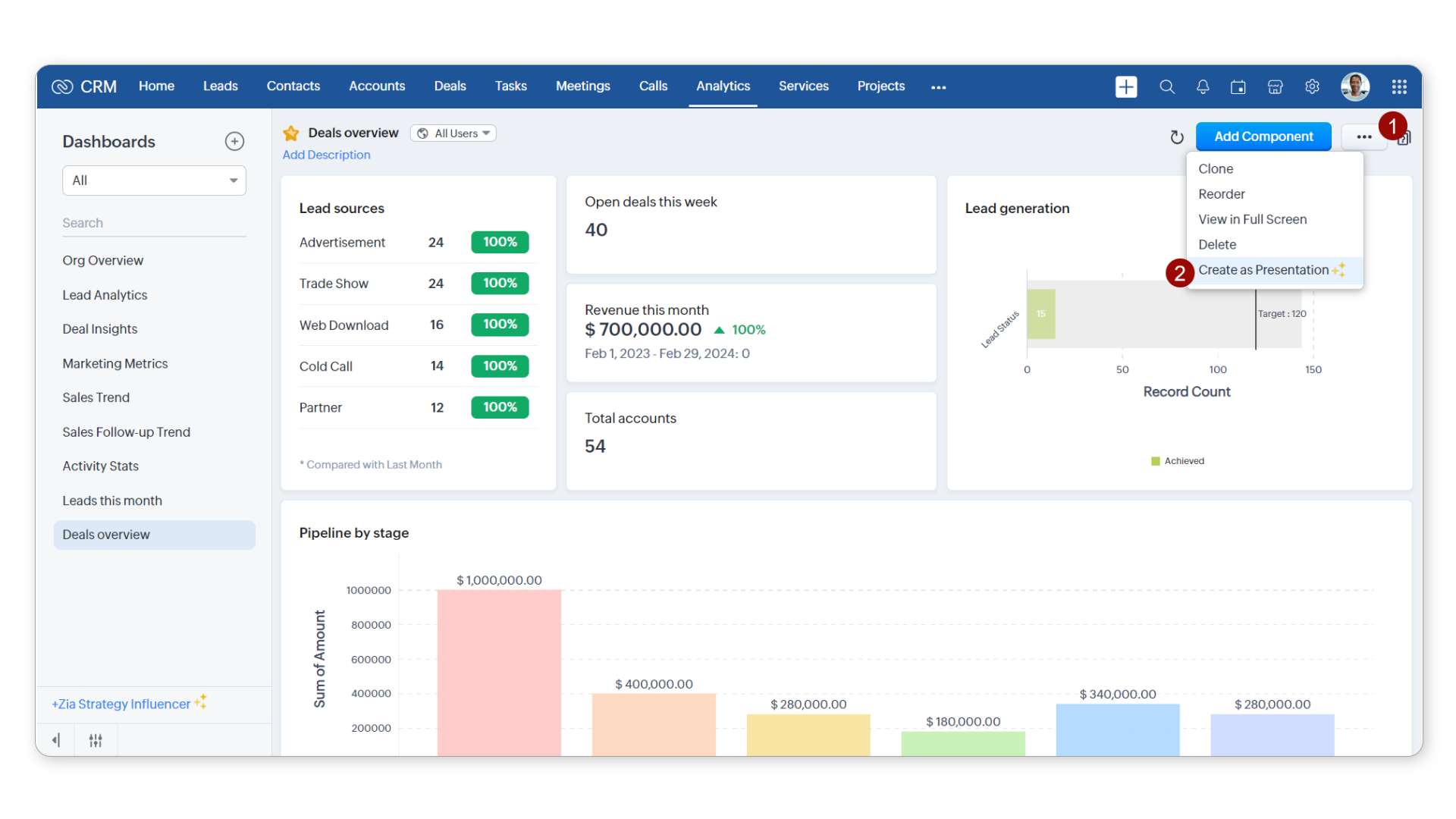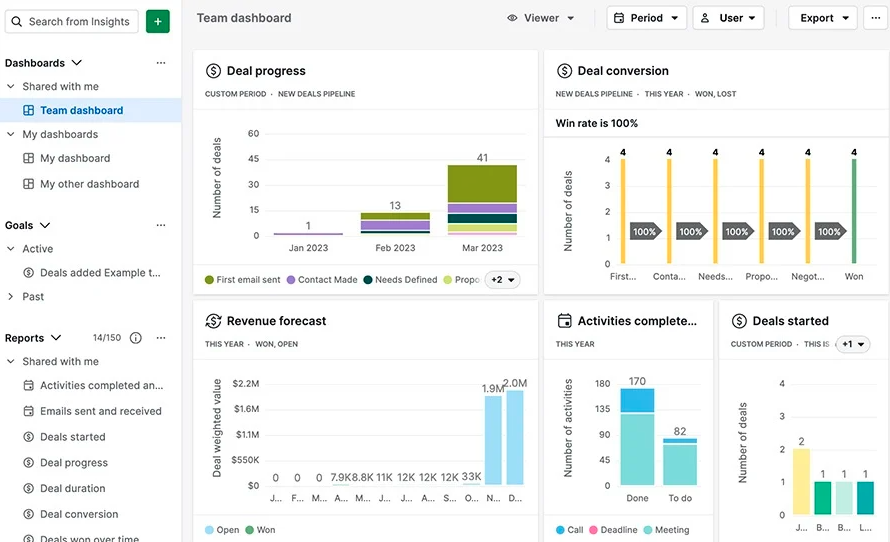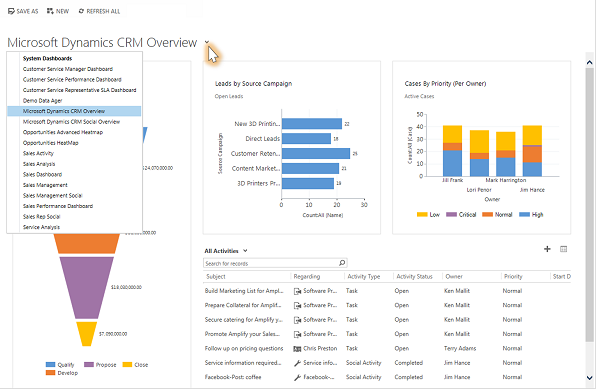In 2025, online stores use smart CRM tools with AI and store links to talk better with customers and sell more. HubSpot, Salesforce, and Zoho help track buyers, send simple messages, and connect easily with Shopify and WooCommerce.
Customer expectations aren’t just rising—they’re completely reshaping how eCommerce operates.
Your customers expect you to remember their preferences, anticipate their needs, and deliver personalized experiences across every touchpoint.
The question isn’t whether you need a CRM anymore. Which one will move the needle for your business?
Top 5 CRM For eCommerce
After evaluating dozens of platforms and analyzing real-world implementations, five CRMs stand out for enterprise eCommerce operations.
Each excels in different areas, so your choice depends on your specific priorities and business model.
Salesforce Commerce Cloud / Customer 360: Can it justify its premium price tag?
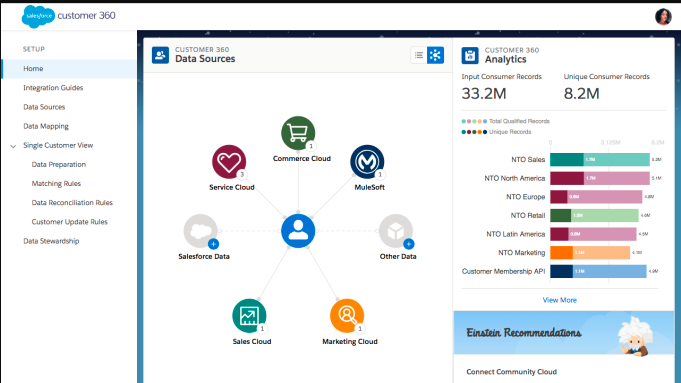
Salesforce earned its reputation as the gold standard for enterprise CRM, but Customer 360 takes this further by unifying commerce, marketing, service, and analytics into a single platform.
The question isn’t whether it’s powerful—it’s whether that power translates to measurable ROI for your business.
The Einstein AI engine drives much of Customer 360’s value proposition. It analyzes customer behavior patterns to predict purchase intent, identifies at-risk customers before they churn, and suggests optimal product recommendations in real-time.
Unlike generic AI features, Einstein learns from your specific customer data to provide increasingly accurate insights.
Core Customer 360 capabilities:
- Connected customer journeys – Automated, personalized sequences across email, web, and sales touchpoints
- Einstein AI predictions – Purchase intent scoring, churn risk identification, and product recommendations
- Enterprise integrations – Connects with SAP, Oracle, and custom applications through MuleSoft with Salesforce integration services making everything work together smoothly.
- Unified customer profiles – Complete view spanning commerce, marketing, service, and analytics
- Cross-departmental collaboration – Slack integration reduces time between inquiries and resolutions
Proven enterprise results:
- 72% improved time to ROI for companies using multiple Salesforce products
- 95% better efficiency compared to single-product implementations
- Faster issue resolution through integrated communication workflows
Pricing starts at $25 per user per month for basic functionality. Enterprise implementations typically range from $300 to $3,900 per user annually, depending on the specific combination of clouds and features.
Many companies engage Salesforce expert for smooth implementation to fully utilize the features.
Best fit: Large-scale enterprises, multi-brand operations, and organizations prioritizing best-in-class customer experience capabilities regardless of budget constraints.
HubSpot CRM: Does It Scale Beyond Small Business Roots?
HubSpot has built its reputation serving small and medium-sized businesses. Still, recent enterprise features make it a serious contender for larger e-commerce operations, especially those prioritizing inbound marketing strategies.
The platform’s strength lies in its integrated approach to attracting, converting, and retaining customers.
Unlike CRMs that bolt on marketing features, HubSpot designed everything to work together from day one.
Lead scoring models automatically adjust based on engagement patterns, and marketing campaigns trigger sales sequences without manual intervention.
Enterprise-ready features:
- Operations Hub – Programmable automation, advanced data hygiene, and AI-powered duplicate management
- Predictive lead scoring – Identifies prospects most likely to convert based on behavior patterns
- AI email writer – Personalizes outreach based on individual prospect behavior and preferences
- Advanced attribution models – Tracks customer journeys across multiple touchpoints and campaigns
- Deep eCommerce integrations – Sophisticated abandoned cart recovery and revenue attribution with Shopify and WooCommerce similarly supported by Salesforce integrations for e-commerce for enterprise needs.
Key advantages for enterprises:
- Quick user adoption – Teams see value within weeks rather than months
- Gentle learning curve – Significantly easier than traditional enterprise alternatives. You can compare Salesforce vs HubSpot before making decision.
- Marketing-sales alignment – Built-in tools facilitate collaboration between departments
- Scalable pricing – Robust free version with competitive enterprise costs
Pricing starts free with a robust version that many growing businesses find sufficient initially. Premium features start at $20 per seat per month, with enterprise features requiring higher-tier plans that remain competitive compared to Salesforce or Dynamics 365.
Best fit: Growing eCommerce brands, B2B eCommerce operations, and companies where marketing and sales alignment is a priority.
Zoho CRM: Can Budget-Friendly Mean Enterprise-Ready?
Zoho’s Q1 2025 updates transformed it from a budget option to a legitimate enterprise contender, particularly for businesses seeking advanced functionality without enterprise-level pricing.
The Zia AI assistant now provides sophisticated sales predictions and performance monitoring that rivals more expensive platforms. You can compare Salesforce vs Zoho to make better decision.
It identifies deals at risk of stalling, suggests optimal follow-up timing, and alerts managers to performance deviations that might indicate problems or opportunities.
Enhanced enterprise features (Q1 2025):
- Account-Based Marketing (ABM) tools – Sophisticated targeting of high-value accounts with personalized campaigns
- Advanced CPQ functionality – Guided selling workflows for complex product configurations and pricing
- Voice of the Customer insights – Aggregates feedback from review platforms, social media, and direct communications
- QuickML integration – Custom AI model creation without coding expertise
- Team selling capabilities – Multiple stakeholder management and clear performance attribution
Zoho ecosystem advantages:
- Comprehensive business management – Zoho Books (accounting), Zoho Inventory (stock management), Zoho Campaigns (email marketing)
- Seamless data sharing – All applications share customer information automatically
- Cost-effective scaling – Enterprise-grade functionality at competitive pricing
- AI-driven insights – Advanced analytics and automation without premium costs
Pricing starts at $12 per user per month with a 30-day free trial. Even the highest tier at $40 per user per month costs significantly less than comparable enterprise platforms while delivering similar functionality. Price comparison is necessary before buying.
Best fit: Budget-conscious enterprises, organizations seeking comprehensive business management beyond CRM, and companies prioritizing AI-driven insights without premium pricing.
Pipedrive: Is Simplicity the Ultimate Sophistication?
Pipedrive takes a different approach than platform-heavy competitors, focusing intensely on sales pipeline optimization rather than trying to be everything to everyone.
For sales-driven eCommerce teams, this focus often translates to better results.
Visual pipeline management makes deal progression immediately clear to sales teams and managers.
The drag-and-drop interface isn’t just user-friendly—it encourages consistent pipeline hygiene that many complex CRMs struggle to maintain.
Sales-focused capabilities:
- AI Sales Assistant – Provides deal predictions and suggests next best actions based on your historical patterns
- Automated lead routing – Ensures qualified prospects reach the right representatives immediately
- Automated follow-up sequences – Keeps leads engaged without manual intervention
- Shopify integration – Creates deals for high-value orders and triggers appropriate sales processes
- Pipeline optimization – Visual drag-and-drop interface encourages consistent deal management
Efficiency benefits:
- 40% reduction in administrative time through workflow automation
- Faster response times – Automated routing prevents leads from falling through cracks
- Actionable reporting – Focus on pipeline velocity, conversion rates, and revenue forecasting
- Quick implementation – Teams start seeing value immediately with minimal training
Pricing starts at $14 per user per month with plans ranging up to $80 per user per month for advanced features. The straightforward pricing structure eliminates the complexity and hidden costs often associated with enterprise platforms.
Best fit: Sales-driven eCommerce operations, B2B companies with defined sales processes, and teams prioritizing ease of use and quick implementation over comprehensive feature sets.
Sales / Dynamics 365 for eCommerce: Is This the Ultimate Enterprise Integration Hub?
Microsoft has positioned Dynamics 365 as more than just a CRM—it’s a comprehensive business platform that integrates customer relationship management with enterprise resource planning, financial management, and operations.
What sets Dynamics 365 apart is its native integration across Microsoft’s entire ecosystem. If your organization already uses Office 365, Teams, or Azure, the chemistry is substantial. The AI-powered Copilot functionality helps sales teams prioritize leads, draft personalized emails, and forecast deal outcomes with impressive accuracy.
Key enterprise capabilities:
- Native ERP integration – Real-time inventory visibility, automated account reconciliation, and sophisticated demand planning
- AI-powered Copilot – Helps prioritize leads, draft personalized communications, and forecast deal outcomes
- Omnichannel customer data – Unifies information from websites, email campaigns, social media, and physical stores
- Global operations support – Handles multi-currency transactions, regional compliance, and localized experiences
- Advanced sentiment analysis – Monitors customer communications across channels with proactive issue alerts
Pricing starts at $65 per user per month for the Sales module, with custom pricing for enterprise implementations. The 30-day free trial provides sufficient time to test integrations with your existing systems.
Best fit: Mid to large enterprises already invested in the Microsoft ecosystem, global eCommerce operations, and businesses requiring tight CRM-ERP integration.
Comparison Of all 5 CRMs
| CRM | Best For | Price & Trial | AI Tools | Integrations | USPs |
|---|---|---|---|---|---|
| Salesforce | Enterprise brands | $25/user 14-day trial |
Einstein AI, suggestions | Shopify, WooCommerce (via MuleSoft/API) |
End-to-end commerce, built-in cart recovery, loyalty modules |
| HubSpot CRM | SMBs, fast growth | Free → $150/seat 14-day trial |
AI emails, automation | Shopify, WooCommerce (Zapier) |
Easy UI, email workflows, loyalty via apps |
| Zoho CRM | Budget SMBs | $12–40/user 15-day trial |
Zia AI, lead scoring | Shopify, WooCommerce (Zoho Flow) |
Low-cost, custom cart flows, loyalty via plugins |
| Pipedrive | Sales teams | $14–80/user 14-day trial |
AI assistant, insights | Shopify, WooCommerce (Zapier) |
Visual pipeline, 3rd-party cart & loyalty |
| Dynamics 365 | Enterprise + MS users | $65+/user 30-day trial |
Copilot AI, insights | Shopify, WooCommerce (AppSource) |
ERP + CRM, custom cart flows, loyalty via add-ons |
What Are the Biggest Pain Points Plaguing Enterprise eCommerce Today?
Understanding your challenges helps clarify what you need from a CRM platform, not just what sounds impressive in a demo.
The Fragmentation Problem
Your customers start their journey on Instagram, research on your website, abandon their cart, receive retargeting via email, and ultimately make a purchase through your mobile app.
Without a unified system, each touchpoint feels like a separate company to them.
Common fragmentation issues:
- Data silos kill personalization – Email marketing teams don’t see support ticket history, leading to tone-deaf campaigns
- Inconsistent customer experiences – Different teams provide conflicting information or duplicate outreach efforts
- Missed opportunities – Sales teams can’t see marketing engagement data, working blind on qualified leads
- Inefficient resource allocation – Teams duplicate efforts or miss high-value prospects due to poor information sharing
Scalability Bottlenecks That Slow Growth
Growth should feel exciting, not overwhelming.
But many eCommerce brands hit walls when their systems can’t handle increased transaction volumes, new product lines, or additional sales channels.
The irony? Success becomes the problem.
Common scalability challenges:
- Transaction volume limitations – Systems that work for 1,000 monthly orders struggle at 10,000
- Geographic expansion complexity – Adding new countries requires separate systems or expensive customizations
- Team coordination breakdown – Larger teams can’t effectively share information or coordinate efforts
- Integration failures – Point solutions that worked independently create conflicts when scaled
- Performance degradation – Slower response times and system crashes during peak periods
The Post-Sale Communication Gap
Here’s where many brands lose money they’ve already earned. After the purchase confirmation email, customer communication often drops off a cliff.
Customer retention costs 5-25 times less than acquisition, yet most brands spend disproportionately on attracting new customers while neglecting existing ones.
Missed post-sale opportunities:
- Proactive shipping updates – Customers left wondering about delivery status
- Satisfaction check-ins – No systematic follow-up to ensure customer happiness
- Strategic upselling – Failing to recommend complementary products based on purchase behavior
- Loyalty program enrollment – Missing chances to convert one-time buyers into repeat customers
- Feedback collection – Losing valuable insights that could improve products or services
What Are the 10 Must-Know Tips for Selecting the Best CRM for an eCommerce Business in 2025?
Choosing a CRM involves more than comparing features and pricing. These practical tips help you avoid common pitfalls and make decisions that improve your business operations.
1. Start with your sales process, not the software. Map out how leads currently move through your organization before evaluating platforms. Choose CRMs that match your existing successful processes.
2. Test with real data and real scenarios. Import actual customer records during trial periods instead of relying on demo environments. This reveals integration challenges and usability issues that sanitized demos hide.
3. Calculate total cost of ownership, not just subscription fees. Factor in implementation costs, training time, data migration expenses, and ongoing customization needs beyond monthly subscription prices.
4. Prioritize user adoption over feature richness. Choose platforms with intuitive interfaces and gentle learning curves. The most powerful CRM is worthless if your team won’t use it consistently.
5. Evaluate integration capabilities with your existing tech stack. Ensure your CRM works seamlessly with your eCommerce platform, email marketing tools, accounting software, and customer support systems.
6. Plan for scalability from day one. Choose systems that can grow with increased transaction volumes, team sizes, and geographic expansion. Migrating CRM platforms is expensive and disruptive.
7. Assess mobile functionality for field teams. Test offline functionality, mobile data entry speed, and synchronization reliability on actual devices if your sales team works remotely.
8. Understand data ownership and export policies. Ensure you can export your data in standard formats if you ever need to switch platforms. Some vendors limit data portability or charge excessive export fees.
9. Evaluate customer support quality and availability. Test response times, technical expertise, and availability during your business hours. Consider time zone differences for global operations.
10. Request references from similar businesses. Speak with companies in your industry and size range who’ve implemented the platforms you’re considering to learn about real-world challenges.
What Trends Are Shaping the Future of CRM for eCommerce Businesses?
Understanding where CRM technology is heading helps you make decisions that won’t become obsolete in two years.
The e-commerce landscape for enterprises is evolving rapidly, and your CRM choice should align with these emerging trends.
AI and Predictive Analytics in Ecommerce CRM
Artificial intelligence has moved beyond being a buzzword to become a practical necessity for competitive e-commerce operations.
Modern CRM platforms use AI to predict customer behavior, automate decision-making, and provide insights that human analysis would miss.
Current AI applications in enterprise CRM:
- Predictive lead scoring – Algorithms analyze engagement patterns, demographic data, and behavioral signals to rank prospects by conversion likelihood
- Churn prediction – Early warning systems identify customers at risk of leaving based on usage patterns, support interactions, and purchasing behavior
- Dynamic pricing optimization – Real-time price adjustments based on demand, inventory levels, customer segments, and competitive intelligence
- Automated content personalization – Email campaigns, website experiences, and product recommendations adapt automatically to individual customer preferences.
- Conversation analysis – Natural language processing extracts insights from customer communications across all channels
The most sophisticated platforms now offer predictive analytics that forecast not just what customers might buy, but when they’ll buy it, how much they’ll spend, and which marketing messages will resonate most effectively.
This level of intelligence transforms reactive customer management into proactive relationship building.
Voice and Conversational CRM Interfaces
Voice technology and conversational interfaces are reshaping how sales teams interact with CRM systems.
Instead of navigating complex dashboards, sales representatives can ask questions in natural language and receive immediate, actionable answers.
Emerging conversational capabilities:
- Voice-activated data entry – Sales reps update records, log calls, and create tasks using voice commands while driving between appointments
- Natural language queries – Ask “Which customers haven’t ordered in 60 days?” and receive instant, filtered lists
- Conversational reporting – Request insights like “Show me our best-performing email campaigns from last quarter” through chat interfaces
- AI-powered coaching – Real-time suggestions during customer calls based on conversation analysis and historical successful interactions
- Automated meeting summaries – Voice recognition technology captures key points, action items, and follow-up tasks from sales calls
These interfaces reduce the friction between customer interactions and data capture, leading to more accurate records and faster response times.
Early adopters report that conversational CRM interfaces increase data quality while reducing administrative time.
Integration with Emerging Technologies
The future of eCommerce CRM lies in seamless integration with technologies that are still in their early stages of development.
Forward-thinking businesses are already experimenting with these integrations to gain competitive advantages.
Next-generation technology integrations:
- Augmented reality (AR) product visualization – CRM systems track which AR experiences lead to purchases and optimize virtual try-on features
- Internet of Things (IoT) sensors – Connected products provide usage data that triggers proactive customer service and predictive maintenance
- Blockchain for customer verification – Secure, decentralized identity management reduces fraud while improving customer trust
- Advanced marketing automation – Integration with programmatic advertising platforms for real-time campaign optimization based on CRM data
- Social commerce platforms – Direct integration with TikTok Shop, Instagram Shopping, and emerging social selling channels
The platforms that will dominate in 2025 and beyond are those that build infrastructure to support these emerging technologies, rather than treating them as afterthoughts.
Your CRM choice should demonstrate clear roadmaps for incorporating new technologies as they mature.
How Do You Choose the Right CRM for Your Enterprise eCommerce Business?
The right CRM choice depends on your specific business model, growth stage, and strategic priorities.
There’s no universal “best” option—only the best fit for your unique situation.
Choose Salesforce Customer 360 if:
- Ultimate scalability and AI-driven personalization are your priorities
- You need best-in-class capabilities and have the budget to match
- Your organization can invest in proper training and implementation
- Enterprise-level integrations with existing systems are critical
Choose HubSpot if:
- Marketing-sales alignment is a strategic priority
- User adoption and ease of use are critical for success
- You want a platform that grows with your business
- Inbound marketing strategies drive your customer acquisition
Choose Zoho CRM if:
- Budget considerations are important but you need enterprise features
- You want comprehensive business management beyond just CRM
- AI-driven insights matter but premium pricing doesn’t fit your budget
- Integration across multiple business functions appeals to your organization
Choose Pipedrive if:
- Sales pipeline optimization is your primary concern
- Simplicity and quick implementation are priorities
- Your team prefers focused tools over comprehensive platforms
- Visual deal management and sales efficiency matter most
Choose Microsoft Dynamics 365 if:
- You’re already invested in the Microsoft ecosystem (Office 365, Teams, Azure)
- Deep CRM-ERP integration is essential for your operations
- Global operations require multi-currency and compliance capabilities
- You need a seamless connection between customer data and back-office systems
Final Thoughts
Your CRM choice will determine how well you understand your customers and how quickly you can respond to that knowledge.
The five platforms we’ve explored each excel in different areas, but success depends on choosing the one that matches your team’s capabilities, business model, and growth trajectory.
Skip the feature comparisons and focus on what matters: which platform will your team use consistently to build better customer relationships?
Stop overthinking this decision. Map your current sales process, identify your most significant pain points, and test the platforms that align with your priorities.
The businesses winning in 2025 don’t have perfect CRM systems—they have the right systems implemented well.
Your customers expect personalized experiences, and your competitors are already ahead of the curve.
Choose your platform, implement it thoughtfully, and start building the customer relationships that will drive your growth as a managed service provider.
FAQs
What is the #1 CRM for e-commerce?
HubSpot CRM is widely recognized as the top choice for e-commerce businesses in 2025. It offers comprehensive features, ranging from free plans for small brands to advanced automation, along with seamless integrations with Shopify, WooCommerce, and Magento.
Do I Need CRM for Ecommerce?
Yes, a CRM provides crucial benefits for e-commerce businesses:
- Centralizes customer data and order history
- Enables targeted marketing through advanced segmentation
- Automates cart abandonment and upsell campaigns
- Improves customer engagement and retention
- Provides actionable analytics for strategy refinement
Can I use a free CRM for my e-commerce business?
Yes. HubSpot CRM, Zoho CRM, and Bitrix24 have free tiers that include essential contact management, deal pipelines, email tracking, and basic automation—perfect for startups and small businesses.
Which CRM integrates best with Shopify?
Top Shopify integrations include:
- HubSpot CRM – Native app with seamless data sync and user-friendly interface
- Salesforce CRM – Enterprise-grade with customizable workflows
- Agile CRM – Excellent automation and customer activity tracking
What are the key CRM features for an online store?
Essential features include:
- Order and transaction tracking
- Customer segmentation and targeting
- Cart abandonment automation
- Multi-platform integrations
- Omnichannel communication
- Customer support ticketing
- Reporting and analytics dashboards
What Are Common Mistakes When Integrating CRM with Ecommerce?
Avoid these pitfalls:
- Choosing based on popularity rather than your specific needs
- Overcomplicating with excessive features or customization
- Neglecting data quality and maintenance
- Insufficient employee training and onboarding
- Poor data integration creating silos
- Not planning for future scalability needs

Hasan Mustafa
Engineering Manager Salesforce at Folio3
Hasan Mustafa delivers tailored Salesforce solutions to meet clients' specific requirements, overseeing the implementation of scenarios aligned with their needs. He leads a team of Salesforce Administrators and Developers, manages pre-sales activities, and spearheads an internal academy focused on educating and mentoring newcomers in understanding the Salesforce ecosystem and guiding them on their professional journey.
